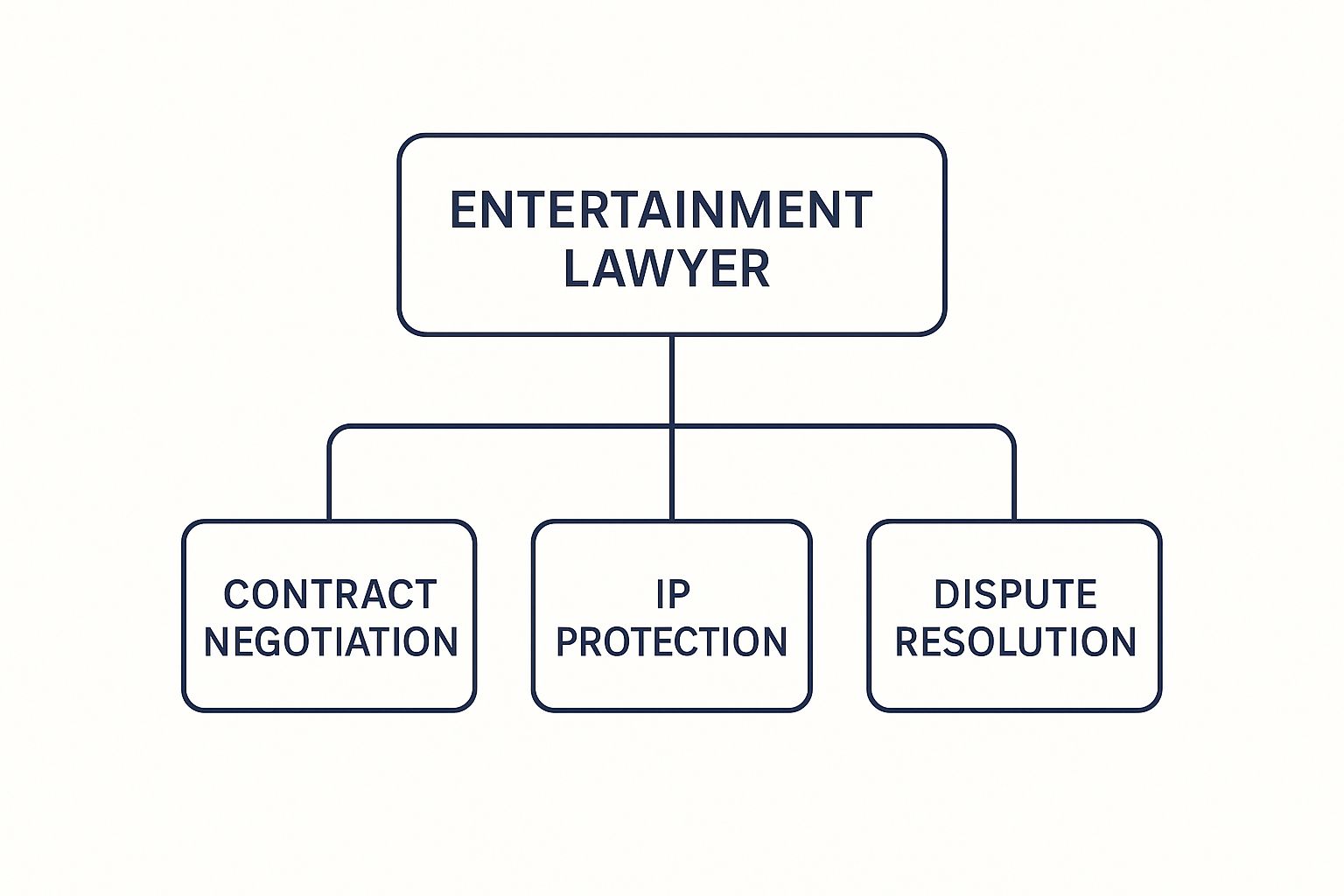Behind every successful artist, filmmaker, or creator, there鈥檚 often a silent partner making sure the business side of their career doesn't fall apart: the entertainment lawyer. Put simply, they are the strategic architects of a creative career. Their job is to handle the complicated business and legal decisions, freeing you up to focus on what you do best鈥攃reate.
The Most Important Person on Your Creative Team
Think of an entertainment lawyer as the captain of your ship, navigating the murky waters of confusing contracts, intellectual property risks, and messy disputes. They aren't just there to clean up problems after they happen. In fact, their most valuable work is done before anything goes wrong, by building a solid foundation for your long-term success. Their guidance protects you from the common industry pitfalls that can easily sink a promising career.
This image gives a great overview of what they actually do.

As you can see, their responsibilities boil down to three key areas: negotiating fair deals, protecting your creative work, and resolving conflicts when they pop up. Each one is absolutely essential for building a career that鈥檚 not just fulfilling, but also profitable and sustainable.
Your Strategic Career Architect
The entertainment world is way more complex than it used to be. It's no longer just about landing a big record deal or a movie contract. Today鈥檚 creators are dealing with streaming rights, digital content monetization, and brand partnerships. This is exactly where a sharp entertainment lawyer becomes your most valuable player. They help you make sense of these opportunities and structure them in a way that actually benefits you.
An entertainment lawyer doesn鈥檛 just review documents; they build the legal framework that allows your creativity to become a business. They are your chief advocate, negotiator, and protector.
It's no surprise that the demand for skilled entertainment attorneys is on the rise. This is mostly driven by the explosion of digital content and the constant innovation in new media. They represent everyone from musicians and filmmakers to companies exploring AI and Web3 technologies. This growth just underscores how critical legal guidance is for everything from financing content to figuring out global distribution. For more on this, check out the insights on entertainment law's expanding role from Penn Career Services.
Essentially, they handle the heavy lifting on the business side so you can have the peace of mind to focus on your art.
To give you a clearer picture, here鈥檚 a quick summary of what an entertainment lawyer handles on a day-to-day basis.
An Entertainment Lawyer's Core Responsibilities
| Area of Responsibility | What It Means for the Client |
|---|---|
| Contract Negotiation | Getting you the best possible terms on record deals, film agreements, publishing contracts, and brand partnerships. |
| Intellectual Property (IP) | Protecting your creations鈥攍ike songs, scripts, and brand names鈥攖hrough copyrights and trademarks so no one else can profit from your hard work. |
| Business Formation | Helping you set up the right legal structure, like an LLC or corporation, to protect your personal assets and manage your income. |
| Deal Structuring | Building the financial and legal framework for complex projects, such as film financing, tour agreements, or multi-platform content deals. |
| Dispute Resolution | Acting as your advocate to solve conflicts with collaborators, labels, or studios, often before things get messy and end up in court. |
| Rights and Clearances | Making sure you have the legal right to use any music, images, or other copyrighted material in your own work to avoid infringement claims. |
This table covers the big-ticket items, but their work often goes much deeper, touching every aspect of a creator's professional life. Their expertise usually breaks down into these key areas:
- Contract Negotiation: Ensuring agreements for records, films, or publishing are fair and favorable.
- Intellectual Property (IP) Protection: Safeguarding your songs, scripts, and other creative works through copyrights and trademarks.
- Dispute Resolution: Acting as your advocate to solve conflicts efficiently, often before they escalate to costly lawsuits.
Crafting Contracts That Build Careers

Contracts are the absolute foundation of any entertainment career. They鈥檙e the documents that turn a handshake and a great conversation into a protected, profitable professional relationship. This is where an entertainment lawyer really shines, acting as the architect for your career and building the framework for your success, one clause at a time.
Think about it like this: you wouldn't build a house without a solid blueprint, right? A contract is the blueprint for your career. A good lawyer is the one who drafts that blueprint, making sure it reflects your vision, protects you from bad weather, and is built to last.
This goes way beyond just proofreading. A skilled lawyer actively gets in there and negotiates every single point to make sure it lines up with your long-term goals. They鈥檙e the ones fighting for fair pay, defining your creative control, and locking down ownership from day one. It鈥檚 all about preventing headaches and arguments down the road.
From Goals to Legally Binding Agreements
So, what鈥檚 actually happening when a lawyer sits down with a contract? They鈥檙e translating your creative vision and financial goals into precise legal language. Every line in that agreement has a purpose, and their job is to make sure that purpose serves you.
This process breaks down into a few key actions:
- Defining Scope: They'll clearly outline what鈥檚 expected of you and what you get in return. This is crucial for preventing "scope creep," where you find yourself doing way more work than you signed up for with no extra pay.
- Securing Fair Compensation: This means negotiating your advances, royalties, residuals, and any profit-sharing terms to make sure they reflect your true value.
- Protecting Creative Control: They鈥檒l fight to ensure you have a meaningful say in how your work is used and presented. For any artist, this is essential for maintaining your integrity.
- Establishing Ownership: This is a big one. The contract determines who owns the final product, a detail that directly impacts your future income and career path.
A well-written contract is more than just a shield; it's a launchpad. For a closer look at these agreements, you can learn more about the specifics of contracts for entertainment and how they shape professional careers.
A contract isn鈥檛 just about protecting you from what could go wrong; it鈥檚 about empowering you to achieve what can go right. It turns abstract goals into tangible, enforceable career milestones.
Demystifying Complex Clauses
Let's be honest, contracts are usually filled with dense legal jargon that鈥檚 tough to understand. Clauses about things like royalties (your cut of sales) and residuals (payments when your work is re-aired or re-used) can make or break your financial future. A lawyer's job is to translate this stuff into plain English and show you its real-world impact.
For instance, a musician's first record deal might look amazing on the surface. But a sharp attorney will spot a clause that could unfairly grab the rights to their future music or stop them from collaborating with other artists. Likewise, an actor's multi-film contract needs a careful eye to ensure fair scheduling and promotional duties.
Your lawyer is the one who sees these potential traps and negotiates better terms. That expertise is often the difference between a thriving career and a cautionary tale you hear about from other artists.
Guarding Your Creative Work as Intellectual Property

For any creator, your work is your most valuable asset. That song, that script, that design鈥攊t's everything. An entertainment lawyer steps in to act as a guardian for this intellectual property (IP), making sure you (and only you) have control over it and can profit from it.
Think of it like this: a copyright is the legal deed to your creative house. It鈥檚 the official paper that proves you own it, giving you the exclusive right to live in it, rent it out, or sell it. Without that deed, anyone could just walk in and claim it's theirs.
Your lawyer is the one who helps you get that deed squared away and then stands guard to keep trespassers out. They help turn your creative passion into a real, legally protected business.
Securing Your Creative Ownership
The very first thing a lawyer does is get your creative works officially registered. This isn't just a formality; it's the difference between having a casual claim to your art and holding a legally enforceable right. They know exactly how to navigate the systems designed to protect you.
The two main forms of protection they'll handle are:
- Copyrights: This is for original works of authorship鈥攖hink songs, scripts, books, and films. Your lawyer will handle the whole registration process with the U.S. Copyright Office, which creates a public, official record that you are the owner.
- Trademarks: This protects things like a band name, a production company logo, or any other symbol used to identify your brand. A lawyer will run searches to make sure your name is unique and then file the application to lock it down.
Getting these rights secured is the bedrock of your career. It's what gives you the legal power to license your work, fight off copycats, and build a brand that lasts.
An entertainment lawyer doesn鈥檛 just protect what you鈥檝e already made; they establish the legal framework that allows you to safely build a career around your future creations.
Turning Your IP into Revenue
Once you officially own your work, your lawyer helps you make money from it through licensing agreements. A license is basically you giving someone permission to use your creative "house" for a specific reason and a set amount of time, all in exchange for payment. It's how one piece of art can generate multiple streams of income.
For instance, a lawyer will negotiate deals to:
- Get your song placed in a movie or a TV commercial.
- Let a company put your character on merchandise.
- Give a streaming service the rights to distribute your film.
Every single one of these deals needs a meticulously crafted contract. It has to spell out exactly how your work can be used, for how long, and how much you get paid. By managing these agreements, a lawyer helps you cash in on your IP without ever signing away your ownership.
For a closer look at the legal side of things, our guide on music and entertainment law offers some extra context.
Navigating Today's Digital Entertainment World
The entertainment industry isn't just about Hollywood studios and major record labels anymore. That world is long gone. Today, we're living in a sprawling digital ecosystem run by streaming giants, social media empires, and even AI-generated content.
This shift has completely changed the game for entertainment lawyers. Their job has exploded beyond traditional contracts, forcing them to become guides through a constantly changing technological frontier.
Instead of just negotiating a film's theatrical distribution, a modern lawyer is more likely found structuring a complex, exclusive series deal with Netflix or Hulu. They are on the front lines, making sure their clients鈥攂e it a filmmaker, musician, or influencer鈥攁re protected and actually get paid in this new arena. That means deeply understanding the unique business models and legal traps hidden inside each digital platform.
From Streaming Deals to Influencer Contracts
Today鈥檚 creators are wrestling with legal questions that simply didn鈥檛 exist a decade ago. A good entertainment lawyer has to be fluent in the language of this new world to have any hope of effectively fighting for their clients. Their work now covers a huge range of new-age challenges and opportunities.
This expanded role touches on a few key areas:
- Streaming Platform Negotiations: Lawyers are the ones in the trenches, structuring and negotiating agreements with services like , Apple Music, and . These deals are notoriously complex, involving royalty structures, exclusivity windows, and global distribution rights that look nothing like old-school contracts.
- Influencer and Brand Partnerships: For any creator on social media, a lawyer is non-negotiable for drafting and reviewing brand partnership agreements. They ensure the contract spells out exactly what the deliverables are, how the content can be used, and the payment terms, protecting the creator from being taken advantage of.
- AI and New Technology Advising: As artificial intelligence becomes a common creative tool, lawyers are advising on the murky legal waters of copyright for AI-generated art and music. They help clients understand both the risks and the incredible opportunities that come with using these new tools.
The industry is absolutely booming, with box-office receipts projected to hit $50 billion and streaming subscriptions expected to blow past 1.5 billion in 2025. This explosion of content, which now includes everything from NFTs to video-game soundtracks, demands legal experts who can jump from a SAG-AFTRA residuals issue to a Digital Millennium Copyright Act (DMCA) takedown notice without missing a beat. You can get a better feel for these trends by checking out these .
In this digital-first environment, an entertainment lawyer鈥檚 job is to secure the future, not just react to the present. They must anticipate technological shifts and build legal protections that stand the test of time.
Ultimately, understanding what an entertainment lawyer does today means seeing them as forward-thinking strategists. They don't just know the law; they understand how technology is fundamentally reshaping the creative industries. Their real job is to position their clients to win as things evolve.
Their work ensures that no matter how the platforms change, the artist's right to be protected and paid stays constant.
Solving Problems Before They Start

While a huge part of what an entertainment lawyer does involves making deals, their unseen value lies in preventing problems from ever starting. But when conflicts do arise, they become your first and most important line of defense.
Think of them as both a proactive strategist and a powerful advocate. Their goal is to find the most efficient and effective solution, keeping your career and relationships intact. A lawsuit is always the absolute last resort鈥攁 costly and stressful path that savvy lawyers work hard to avoid.
The Strategic Path to Resolution
When a dispute pops up鈥攕ay, a royalty disagreement between a band and their label鈥攁 lawyer doesn鈥檛 just jump to litigation. Instead, they follow a strategic ladder of options designed to resolve the issue quickly and quietly.
Their approach usually follows a clear progression:
- Negotiation: The first step is almost always a direct, strategic conversation. Your lawyer will communicate with the other party's legal team to find common ground and reach a private settlement.
- Mediation: If negotiation stalls, a neutral third-party mediator is brought in to help both sides find a compromise. This is still a collaborative process focused on finding a win-win solution without going to court.
- Litigation: Only when all other avenues fail does a lawsuit become the necessary path. It's the most aggressive option, and your lawyer will shift into full advocate mode to fight for your rights in a courtroom.
This tiered approach saves time, money, and professional relationships. To avoid these issues in the first place, it's crucial to understand your rights, and you can learn more by checking out our guide on how to avoid copyright infringement.
The best lawyers don't just win fights; they prevent them from ever starting. Their expertise in structuring deals and anticipating conflict is their greatest asset to a client's career.
This dual expertise as both a deal-maker and a dispute resolver is essential. Entertainment attorneys offer comprehensive services covering everything from film financing and intellectual property to union regulations and endorsement deals, all aimed at minimizing litigation risks.
Common Questions About Entertainment Lawyers
Diving into the entertainment industry can feel like a lot all at once. It's totally normal to have questions about who you need on your team. When it comes to the legal side of things, getting a few key questions answered can make a world of difference for your career.
A lot of creators ask if they really need a lawyer yet. The best time to bring an entertainment lawyer into the picture is before you sign any significant contract. This means record deals, publishing agreements, management contracts, or major performance offers. Think of it as a proactive investment in your future. A lawyer ensures your interests are protected from day one and stops you from getting locked into bad terms that are a nightmare鈥攐r impossible鈥攖o fix later.
Lawyer vs. Agent: What Is the Difference?
This is a classic point of confusion, but lawyers and agents play very different, very distinct roles. They both work to move your career forward, but they stay in separate lanes.
- An 补驳别苍迟鈥檚 main job is to find and secure opportunities for you鈥攖hey are the deal-finders.
- An entertainment lawyer鈥檚 job is to handle the legal and business side of those deals.
So, the agent gets you the gig, but the lawyer hammers out the contract, protects your intellectual property, and gives you the strategic advice to make sure the deal is actually good for you in the long run.
"An agent gets you in the door. A lawyer makes sure the house you're entering is safe, secure, and built to last."
Having this separation of duties is key to creating a system of checks and balances for your career.
Finally, how do you pay these pros? The structure can vary. Many lawyers charge a standard hourly rate for their time. Some might work on a retainer, which is a recurring fee for their ongoing legal support. A very common setup in this business, though, is a percentage-based fee (usually around 5%), where the lawyer takes a cut of the value of the deals they negotiate for you. The right option really just depends on your specific needs.
At Cordero Law, we believe in empowering creators with clear, strategic legal guidance. If you're ready to protect your career and turn your passion into a sustainable business, reach out to our team to see how we can help.
